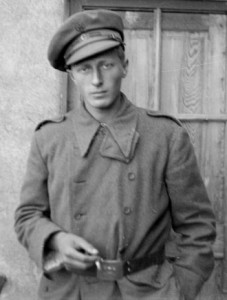Two students win 2011 ALBA essay awards

George Watt in Spain. (The 15th International Brigade Photographic Unit Photograph Collection; ALBA Photo 011; ALBA Photo number:11_0186s. Tamiment Library/Robert F. Wagner Labor Archives.)
ALBA’s George Watt Memorial Essay Prizes are awarded annually to a graduate student and an undergraduate student who have written an outstanding essay or thesis chapter about any aspect of the Spanish Civil War, the global political or cultural struggles against fascism in the 1920s and 1930s, or the lifetime histories and contributions of the Americans who fought in support of the Spanish Republic from 1936 to 1938. The award, first established 15 years ago, pays homage to the life of Lincoln vet George Watt (1914-1994), a writer and lifelong activist central to the creation of ALBA.
The jury, consisting of Soledad Fox (Williams College), Fraser Ottanelli (University of South Florida), and Gina Herrmann (University of Oregon), is pleased to announce the results for this year’s contest. We received 15 submissions in total: 10 written by undergraduate students and five from MA or PHD students. Essays came from Spain, England, and the U.S. The research topics included dance performances by Republicans in exile, anticlericalism in the Civil War and how it was perceived by American Catholics, children’s drawings, the mobilization of Northumberland Mining Unions, and the depiction of women in illustrated magazines during the war.
The recipient of the undergraduate award is Zachary Ramos Smith, whose senior thesis in history at the University of Washington deals with the life story of Lincoln veteran Thane Summers. Ramos Smith explores how leftist politics helped Summers overcome feelings of emotional and social estrangement from his bourgeois background. In the graduate category, Maria Thomas, a doctoral student at Royal Holloway (University of London), impressed the jury with her detailed study of anticlerical violence committed by male workers during the Civil War. Thomas uses this particular case of masculine violence to delve into the repercussions of sexist attitudes and beliefs in 1930s Spain.












